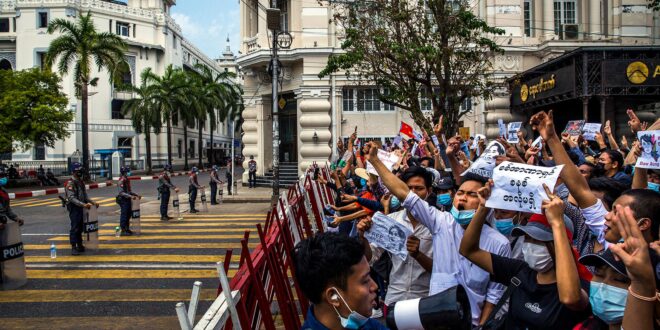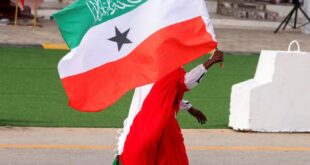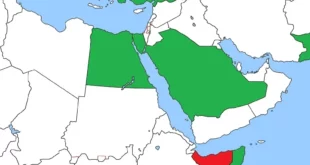An army leader miscalculated the costs of wresting back power. Now the country reels from the violence.
Few countries this year dramatize more powerfully the need for a global focus on strengthening democracy than Myanmar, now 10 months into a new chapter of military dictatorship and violence following its February 1 coup. Myanmar is a testament to the vulnerability of democracy when armed forces expect no repercussions for brutality and can rely on support from authoritarian governments which will arm, legitimize and finance them. As the United States and partners seek ways to boost democracy in this week’s White House summit, experts on Myanmar offered recommendations for policy.
The Burmese army struck early on February 1, just hours before the nation’s parliament—with a newly re-elected majority for the National League for Democracy party—was to take office. Their assault ended a 10-year effort at economic and political reforms intended to introduce democracy after a prior half-century of predominately military rule. In the ten months since, the military has sought to re-establish control through violence in the face of mass resistance from the public. The regime has killed over 1,300 peaceful protesters and arrested nearly 11,000, launched airstrikes against civilians in resistance strongholds and burned villages to the ground. It has eliminated virtually all independent media and facilitated an economic collapse that has left more than half the country below the poverty line.
The Makings of a Coup
Myanmar specialists in a USIP online forum this week described enabling factors for the coup—domestic and international incentives, unchecked military power and personal ambition. The key elements included:
The military’s anxiety about its diminished economic and political power. After winning power in a 2015 election, the National League for Democracy (NLD), led by Aung San Suu Kyi, initiated major economic reforms that encouraged diversification and competition in Myanmar’s economy. These policies threatened military-owned monopolies in the country’s largest economic sectors. Furthermore, the NLD spent considerable effort exploring ways to strengthen civilian oversight of the military. The commander-in-chief of the army, Min Aung Hlaing, calculated that the military’s influence over the country’s economy and politics would likely decrease dramatically over the coming five years. On the eve of the coup, Min Aung Hlaing demanded that the newly re-elected NLD leaders accept a power-sharing agreement, which they rejected.
Military isolation. Because of the army’s growing alienation from the public and its failures to properly gauge public sentiment, one expert in the USIP forum assessed that Min Aung Hlaing was led to believe that the population’s frustrations with the NLD would translate into weak opposition to a military takeover. Min Aung Hlaing perceived Myanmar’s minority insurgent groups as the primary threat to the military’s power. Leading up to the coup, the general negotiated a ceasefire with one of those ethnic armed organizations, the powerful Arakan Army, while laying the groundwork for negotiations with others.
Political ambition. The military’s rigid hierarchy enabled Min Aung Hlaing to give priority to his own political ambitions, risking the longer-term viability of the military’s institutional interests. Because the general faced a legal requirement to retire from the armed forces upon turning 65 in July 2021, last year’s landslide electoral victory by the National League for Democracy spelled the end of his political career. Faced with the prospect that he would never achieve his dream of the presidency, Min Aung Hlaing found a coup his best remaining option.
A military without guardrails. The military was able to act with impunity because, under the 2008 Constitution (which it wrote), it was accountable to no one. Despite a history of atrocities against human rights activists and ethnic minority populations, most notably the Rohingya, the military has never faced consequences. Furthermore, the 2008 Constitution granted the military unfettered control of the entire security apparatus, including the police, leaving the elected government powerless to oppose an armed takeover. Notably, international aid that poured into the country during its 2011-2020 effort to shift towards civilian governance failed to address the military’s structural advantages, and in many cases reified those structures. The failed peace process, which enjoyed millions of dollars in international support, for example, was designed based on the existing power structures and helped entrench that structure.
A lack of international accountability. The coup-makers in Myanmar enjoy protection from international accountability—even in the face of near-daily video evidence, available to the world, of the military’s gruesome atrocities. Authoritarian governments, especially Russia, China and authoritarian states in Southeast Asia, block binding action at the U.N. Security Council and in the Association of Southeast Asian Nations (ASEAN). Russia and China have mounted strong international campaigns, both bilaterally and through multilateral bodies, to undermine action in defense of democracy or human rights. By March, a month after the coup, China’s official objective in Myanmar was “preventing the involvement of the U.N. Security Council” and “preventing foreign interference on the grounds of human rights and democracy.” China tabled a statement at the U.N. Human Rights Commission in Geneva in August that was signed by 41 other authoritarian regimes calling for the United Nations to prevent such forms of multilateral and bilateral intervention. Russia has been involved in similar initiatives, including through its bilateral treaty of amity with China. Opposition to international intervention among democratic nations, particularly in the aftermath of the U.S. withdrawal from Afghanistan, also provides comfort to Myanmar’s military that anything beyond well-meaning statements of concern is unlikely.In short, the expected benefits of a coup (restoring the military’s political and economic dominance and achieving Min Aung Hlaing’s personal political objectives) outweighed the expected costs (minimal armed opposition, international inaction, and no long-term accountability). Myanmar demonstrates that democracy is vulnerable when militaries are not constrained by and held accountable to democratically elected civilian government, when they expect no repercussions for brutality and when they have a deep bench of authoritarian governments who will arm, legitimize and finance them.
What Can Be Done?
Faced with anemic international institutions and opposition to intervention among the American public, the United States and other democracies have few options to affect the Myanmar military’s calculations. Nonetheless, coordinated efforts paired with the strategic action by the movement in Myanmar could have a more robust effect. Myanmar experts at USIP’s forum this week identified several ways the United States and others can promote a restoration of democracy in Myanmar:
Increase the cost of the military’s brutality. Democratic governments and institutions should hold the military accountable for past atrocities, undermining its legitimacy in international forums and cutting its access to essential resources such as foreign currency and weapons. They should identify the military’s atrocities against Rohingya in 2017 as genocide and support efforts to prosecute the military in the United States, under universal jurisdiction, and at the International Criminal Court and the International Court of Justice. Policymakers should support ASEAN’s efforts to exclude the military regime from key summits and should continue to prevent its participation in other international bodies through which it would gain legitimacy. Democracy advocates should press for a global arms embargo and should vigilantly monitor breaches of U.S. and international sanctions.
Support civil society in Myanmar. Despite the military’s best effort to quash it, civil society in Myanmar persists and serves an increasingly important role providing essential services to vulnerable communities and by organizing anti-coup activities. The United States and other democracies should continue to provide financial and technical support to civil society.
Support political dialogues across Myanmar’s diverse, anti-coup movement. These include dialogues under the People’s Representative Committee for Federalism and the National Unity Consultative Council. Where possible, the United States should support solidarity and trust-building within the anti-coup movement. Dialogues should aim to sincerely address past discrimination and abuses, including those by the NLD and others who have held positions of power.
Provide technical support to the anti-coup movement. Democracies should support Burmese efforts to develop a strategy for political transition and national rebuilding, including efforts to pursue transitional justice. Dialogue around the nuts and bolts of a federal democratic structure is important not only to slowly build consensus toward a governance model, but also to help diverse groups better understand one another.
Strengthen the role of regional partners. International efforts should provide strong incentives and support for critical democracies in the region such as India, Japan and Indonesia to increase dialogue with and assistance for pro-democracy political parties and non-state ethnic nationalities authorities in Myanmar. The United States should increase high-level diplomatic engagement with ASEAN to enhance that organization’s resilience to attempts by China to undermine the role the bloc may play in putting the country back on a path toward democracy. Eurasia Press & News
Eurasia Press & News



